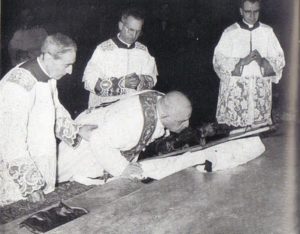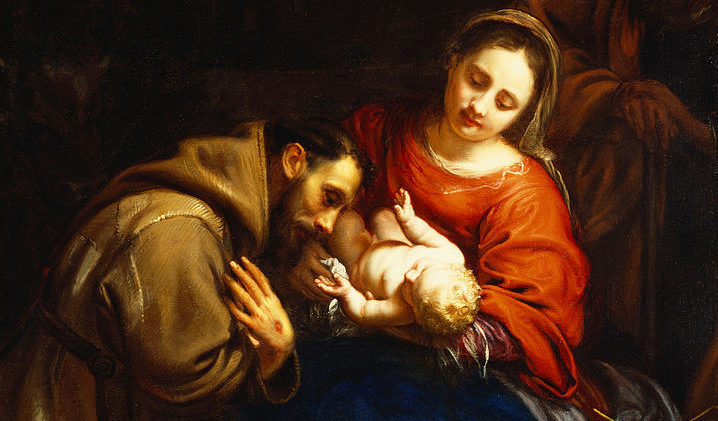
There was haste. they were being pressured by many Bishops especially in France and Germany, I think it was mostly Germany who were pushing for this, it was needed, they said, it wasn’t applying to the people anymore whatever else but they kept fighting for these things.
So that the abuses wouldn’t take place they “felt compelled to do everything quickly”.
If you think about it that’s the same thing they did with the Eucharistic with Communion in the hand, there was abuses that were taking place: this is what Paul VI wrote, so we will allow communion in the hand to eliminate the abuses.
That was just the way they thought back then I’m not sure what else to say about it.
Good Friday novelty…they’re changing colors all the time they have to keep changing vestments in different colors, the passion changed obviously they eliminated the gospel, Adoration of the Cross changed, the altar doesn’t have a cross(that’s strange), the procession becomes simple: it’s no longer a triumphant and Eucharistic, but quiet and reserved
The deacon replaces the priest in going to get the Blessed Sacrament, and other things…
Holy Saturday we are now blessing a candle outside, remember the candle before was so big it stayed inside and you just brought fire to it… now we’re blessing the candle outside walking around the candle singing Lumen Christi, which really isn’t it isn’t a big problem, but it creates other problems later.
Now we have a candle in the center of the sanctuary, and we’re walking around the candle incensing it…why are we walking around the candle incensing it?
Nobody knows…now we’re singing the Exsultet which was the blessing of the candle now in the Exsultet when you read when they’re singing we always wonder…you know it’s beautiful, we love the Exsultet, but if you think about it the whole purpose of these reforms is to eliminate anything that is “superfluous” meaning it doesn’t have a purpose
But there’s a few things where what they did was they eliminated the purpose and left something Superfluous.
The Exsultet was the blessing of the candle…he sings, stops, lights the candle, he sings, stops, puts in the incense he sings, stops, lights the other lamps, these are the things that are happening during the Exsultet it is a Consecratory Prayer.
Some people have argued that “it’s not really a prayer it’s not really a blessing of the candle”, but the rubrics say that “the Deacon blesses the candle”, so I don’t know, the Missal used to be considered authoritative; So I take it from that principle liturgically.
The Exsultet…now you just have a candle in the middle, you walk around and incense it, you’re not sure why you’re doing it, and then you face it and you sing the Exsultet and then you’re done. They didn’t explain why you’re doing it that way, they just decided to do it that way.
There’s 12 prophecies in the old Holy Week now, when they put forward the new one they put four. Why they put four we don’t know, they just put four.
Then a couple years later they did the Paul the Sixth reform they put six. Now we have six.
That at least liturgically was a Roman custom a long time ago that had six readings so at least that went back to an old Roman custom whereas the four, nobody knows, they just did four, alright four. They corrected that
The Paul VI Missal and the renewal of the baptismal promise. So on Holy Saturday you stop after the prophecies, you turn to the people, and you renew their baptismal promise.
I forget the wording that they use but it’s in Latin it’s a bit funny – Then you do the Our Father with everybody in the vernacular so now we’re at a ‘traditional liturgy’ and you’re standing there in front of everybody: “Our Father who art…”
We did it once and there were two people there at the Liturgy – middle of the night, you’re in the middle of night nobody’s going to mass – the middle of the night, so there was two(and I don’t think they were even Catholic, I don’t know) that walked in, we were in Italy, they walked in they sat in the very last Pew…I don’t know what they were doing there, we were having this Grand liturgy it was the only time I’ve ever done the the ‘55 liturgy, it was 2009 and we were there at a cloistered group of nuns so they left the door open and these people came in so we had to turn and do this…there’s nobody there and they wouldn’t even look at us they could care less what was going on. I don’t know why they were there. Maybe they were just up late but it’s just strange, you turn to them and you start talking to the people and the people aren’t there, you’re just told by the rubrics to turn and do this.
Well anyways that’s it, we renew our baptismal promise and the Our Father in the vernacular.
Baptismal Font…I don’t understand this one fully but it seems like the meaning got changed you’ll have to read that article to figure it out but he refers to it in the conclusion. But now you don’t go to the baptismal font there’s no procession to the baptism baptismal font to bless it because remember you weren’t blessing the baptismal font you’re blessing the water but it’s such a sacred consecration of this water that it blesses the font that’s why they call it the blessing of the baptismal font but now you put a table in front of the altar and you got bowls of water in front of the people.
I forgot to say also in Palm Sunday it’s the very first time – in the new Holy Week – where we see a table is to be set in front of the altar towards the people to bless the Palms. First time we ever see this facing the people on the table in the sanctuary facing the people.
So back to baptismal promise before we bless the water you say half of the litany…so you say half of the Litany of the Saints and you stop, then you bless the water, then you say the second half of the litany. Why are you breaking the litany in half? that has never ever happened in the Roman Rite, nobody’s ever broken: you don’t stop the litany and do something else.
You would do it in ordinations because the bishop stands up and says the words – he says words that are the formal words consecrating that priest or that Deacon. Consecratory words happen in the middle, and then he kneels back down and keeps going, but those words are part of the Litany.
Then the mass is pretty much the same except because it’s so late at night you do Lauds for the next day which isn’t a problem, it’s probably a magnificent way to finish it off.
PO Box 1054
Lawrenceburg, KY 40342 – USA
romanseraphicbooks@protonmail.com
